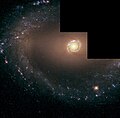NGC 1512
| NGC 1512 | |
|---|---|
 NGC 1512 and NGC 1510 imaged by the Cerro Tololo Inter-American Observatory | |
| Observation data (J2000 epoch) | |
| Constellation | Horologium |
| Right ascension | 04h 03m 54.3s[1] |
| Declination | −43° 20′ 56″[1] |
| Redshift | 898 ± 3 km/s[1] |
| Distance | 11.6 Mpc (38 Mly) h−1 0.73[2] |
| Apparent magnitude (V) | 11.1[1] |
| Characteristics | |
| Type | SB(r)ab[1] |
| Apparent size (V) | 8.9′ × 5.6′[1] |
| Other designations | |
| PGC 14391[1] | |
NGC 1512 is a barred spiral galaxy approximately 38 million light-years away from Earth[2] in the constellation Horologium. The galaxy displays a double ring structure, with a (nuclear) ring around the galactic nucleus and an (inner) further out in the main disk. The galaxy hosts an extended UV disc with at least 200 clusters with recent star formation activity.[3] NGC 1512 is a member of the Dorado Group.[4]
Gravitational interaction with NGC 1510
[edit]Gravitational tidal forces of NGC 1512 are influencing nearby dwarf lenticular galaxy NGC 1510. The two galaxies are separated by only ~5 arcmin (13.8 kpc),[3] and are in the process of a lengthy merger which has been going on for 400 million years.[5] At the end of this process NGC 1512 will have cannibalised its smaller companion.[6]
Interaction between these two galaxies has triggered star formation activity in the outskirts of the disc and enhanced the tidal distortion in the arms of the NGC 1512. The interaction seems to occur in the north-western areas of the system because of the broadening of the H i arm and the spread of the UV-rich star clusters in this region.[3]
Gallery
[edit]-
The galaxy seen by the Hubble Space Telescope.
-
NGC 1512 seen by the James Webb Space Telescope.
See also
[edit]References
[edit]- ^ a b c d e f g "NASA/IPAC Extragalactic Database". Results for NGC 1512. Retrieved 2006-11-25.
- ^ a b "NASA/IPAC Extragalactic Database". Results for NGC 1512, Co-Moving Radial Distance. Retrieved 2014-12-18.
- ^ a b c Koribalski, Bärbel S.; López-Sánchez, Ángel R. (2009). "Gas dynamics and star formation in the galaxy pair NGC 1512/1510". Monthly Notices of the Royal Astronomical Society. 400 (4): 21. arXiv:0908.4128. Bibcode:2009MNRAS.400.1749K. doi:10.1111/j.1365-2966.2009.15610.x. S2CID 9329781.
- ^ Maia, M. A. G.; da Costa, L. N.; Latham, David W. (April 1989). "A catalog of southern groups of galaxies". Astrophysical Journal Supplement Series. 69: 809–829. Bibcode:1989ApJS...69..809M. doi:10.1086/191328.
- ^ a b "Galactic David and Goliath". www.spacetelescope.org. Archived from the original on 1 December 2017. Retrieved 27 November 2017.
- ^ "NGC 1512 and NGC 1510". sci.esa.int. Archived from the original on 1 December 2017. Retrieved 27 November 2017.
External links
[edit]- NASA Astronomy Picture of the Day: A Panchromatic View (6 June 2001)
- SPACE.com: Baby Stars Clean House Quickly




